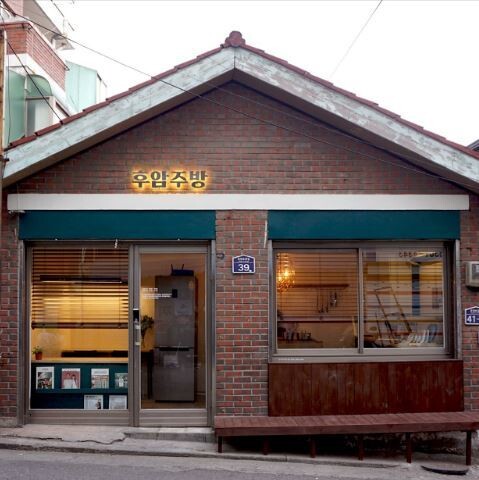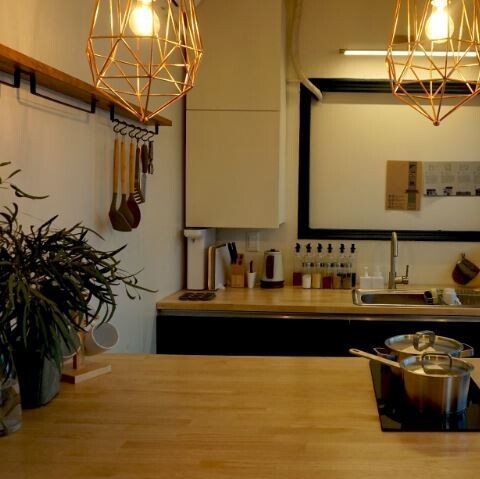hankyoreh
Links to other country sites 다른 나라 사이트 링크
Beyond instant noodles: young singles expand their diets to healthy options

Fruit was largely not an option for Park Beom-gi (29, a resident of Seoul’s Seongbuk District), who has been living on his own for five years. When he went grocery shopping, he typically didn’t reach for fresh produce, which was sold in big packages at high prices. One time, he ordered a 7.5 kg box of Asian pears but wasn’t able to finish them before having to throw them away.
In early March, after a lot of thought, Park created “Fruit Adventure,” a cooperative fruit purchasing group consisting of a handful of singles and couples living in the Seongbuk neighborhood. Once a month, the group collects 10,000 won (US$8.90) from each household for purchasing and distributing fruit in season. The group buys the fruit directly from a trustworthy supplier.
“I was in such a hurry to arrange my meals that I didn’t think about the need to eat fruit and vegetables. I think the cooperative purchasing arrangement will help me to eat fruit and vegetables on a regular basis, something I wasn’t able to do before,” Park said.
With single-person households identified as a new population segment that’s vulnerable to health issues, young people living by themselves are making various efforts to eat healthier meals. A recent survey of 453 office workers and university students in their 20s carried out by the Korea Health Promotion Institute disturbingly concluded that 55% of respondents don’t eat a decent meal when they eat alone, with 35.8% just throwing something together and 19.2% mostly eating junk food. Among the people in their 20s and 30s living alone who deal with the issue, some are putting their heads together in an attempt to divvy up the duties of buying groceries and preparing dishes.
Park Jin-yeong (34, Yangcheon District of Seoul) and four of her friends who live alone run a KakaoTalk chatroom dedicated to cooperative fruit purchases. Whenever someone goes grocery shopping, they figure out what kind of fruit everyone wants and then divide their purchases among the group.
“When I buy strawberries and bananas, I can’t eat them all, and so they usually get soggy. But if we collect between 10,000 and 15,000 won from each person for a group purchase, we can buy four kinds of fruit and get the right amount for one person to eat,” Park said.
Some people living alone have even set up a cooking collective. At the beginning of this month, Kim Ji-hyeon (28, Mapo District of Seoul) got together with some of her neighbors to make side dishes. When people cook for themselves, the dish ends up being too big, and most of the food gets thrown out. After a few rounds of the vicious cycle of cooking food and throwing it away, Kim and friends dealing with the same issue went shopping and cooked up some seasoned bulgogi (fried meat) on Mar. 5, which they then divided among themselves. “By cooking food together, we were able to save on the cost of the ingredients and cut down on the stress of the cooking. It may not be a regular thing, but we intend to continue our cooking collective,” Kim said.
Common kitchens are also appearing. At the beginning of this month, the Urban Empathy Collective architecture firm opened “Huam Kitchen” in the Huam neighborhood of Seoul’s Yongsan District. About 10 square meters in size, the kitchen is equipped with basic cooking implements, along with salt, pepper and other seasonings, and can accommodate from four to six cooks. The kitchen is open to anyone, costing between 2,000 to 4,000 won (roughly US$2-4) an hour.
“The fact is that the studio apartments and guesthouses that young people typically live in have small kitchen spaces without many cooking implements, so it’s not practical to invite friends over to share a meal. I opened the kitchen with the idea that it would be great for people living alone to have a place where they can cook for an affordable price,” said Lee Jun-hyeong, office manager at Urban Empathy Collective.

By Ko Han-sol, staff reporter
Please direct questions or comments to [english@hani.co.kr]

Editorial・opinion
![[Editorial] Does Yoon think the Korean public is wrong? [Editorial] Does Yoon think the Korean public is wrong?](https://flexible.img.hani.co.kr/flexible/normal/500/300/imgdb/original/2024/0417/8517133419684774.jpg) [Editorial] Does Yoon think the Korean public is wrong?
[Editorial] Does Yoon think the Korean public is wrong?![[Editorial] As it bolsters its alliance with US, Japan must be accountable for past [Editorial] As it bolsters its alliance with US, Japan must be accountable for past](https://flexible.img.hani.co.kr/flexible/normal/500/300/imgdb/original/2024/0417/6817133413968321.jpg) [Editorial] As it bolsters its alliance with US, Japan must be accountable for past
[Editorial] As it bolsters its alliance with US, Japan must be accountable for past- [Guest essay] Amending the Constitution is Yoon’s key to leaving office in public’s good graces
- [Editorial] 10 years on, lessons of Sewol tragedy must never be forgotten
- [Column] A death blow to Korea’s prosecutor politics
- [Correspondent’s column] The US and the end of Japanese pacifism
- [Guest essay] How Korea turned its trainee doctors into monsters
- [Guest essay] As someone who helped forge Seoul-Moscow ties, their status today troubles me
- [Editorial] Koreans sent a loud and clear message to Yoon
- [Column] In Korea’s midterm elections, it’s time for accountability
Most viewed articles
- 1[Column] The clock is ticking for Korea’s first lady
- 2Samsung barricades office as unionized workers strike for better conditions
- 3[Editorial] When the choice is kids or career, Korea will never overcome birth rate woes
- 4[Editorial] As it bolsters its alliance with US, Japan must be accountable for past
- 5S. Korea, Japan reaffirm commitment to strengthening trilateral ties with US
- 6[Guest essay] How Korea turned its trainee doctors into monsters
- 7Japan officially says compensation of Korean forced laborers isn’t its responsibility
- 8Why Israel isn’t hitting Iran with immediate retaliation
- 9Worse than worst case: Korea’s population is shrinking faster than predicted
- 10[News analysis] After elections, prosecutorial reform will likely make legislative agenda